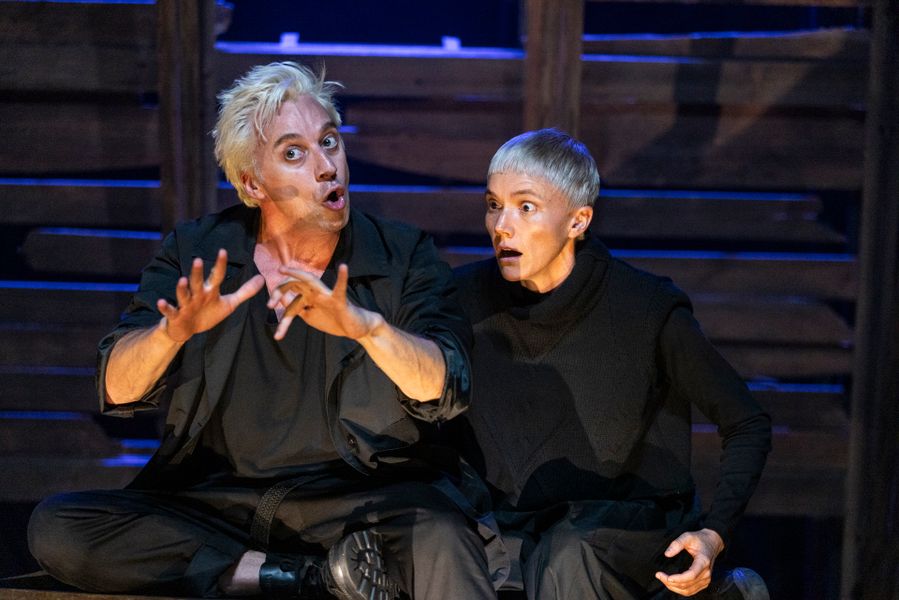


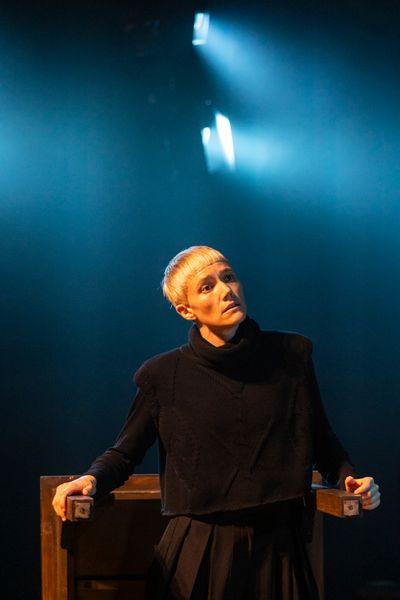
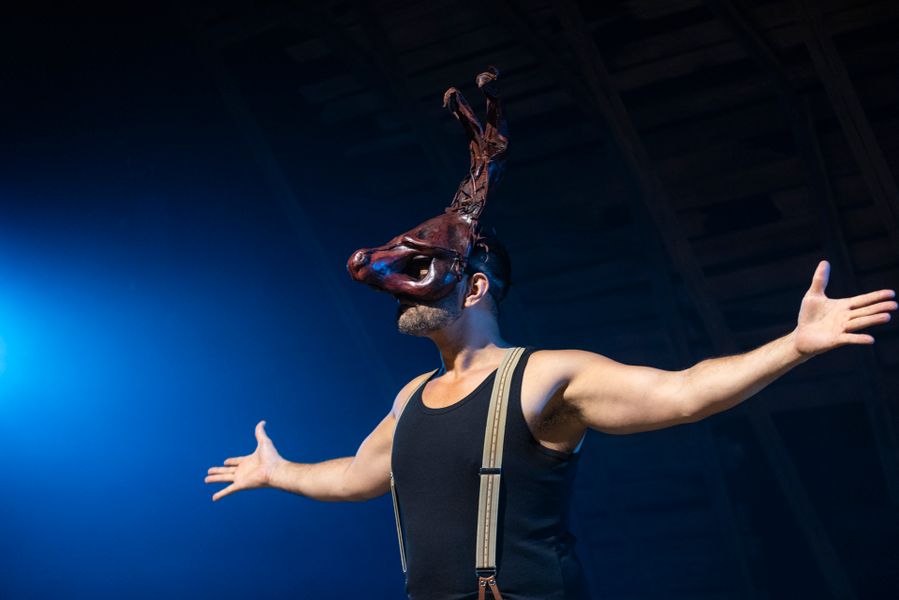
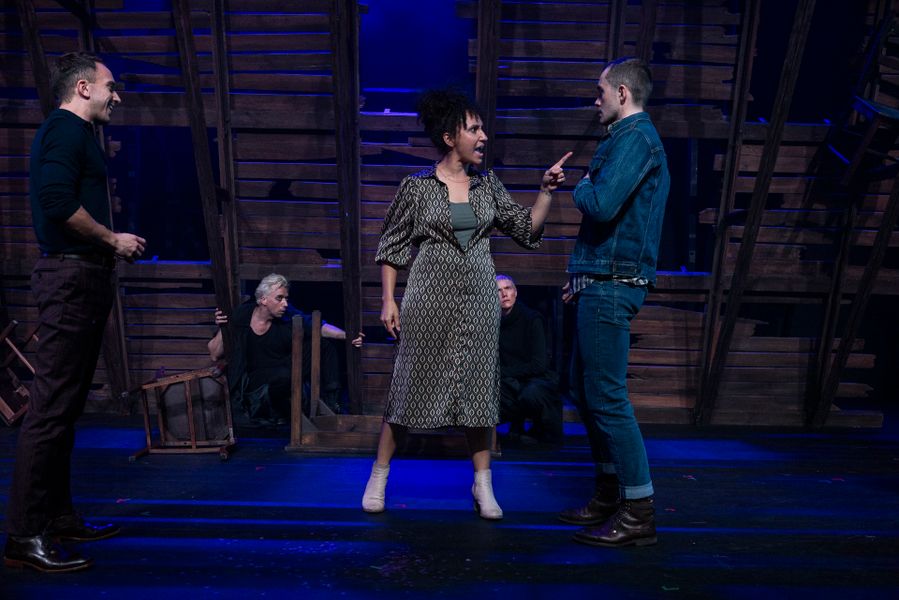
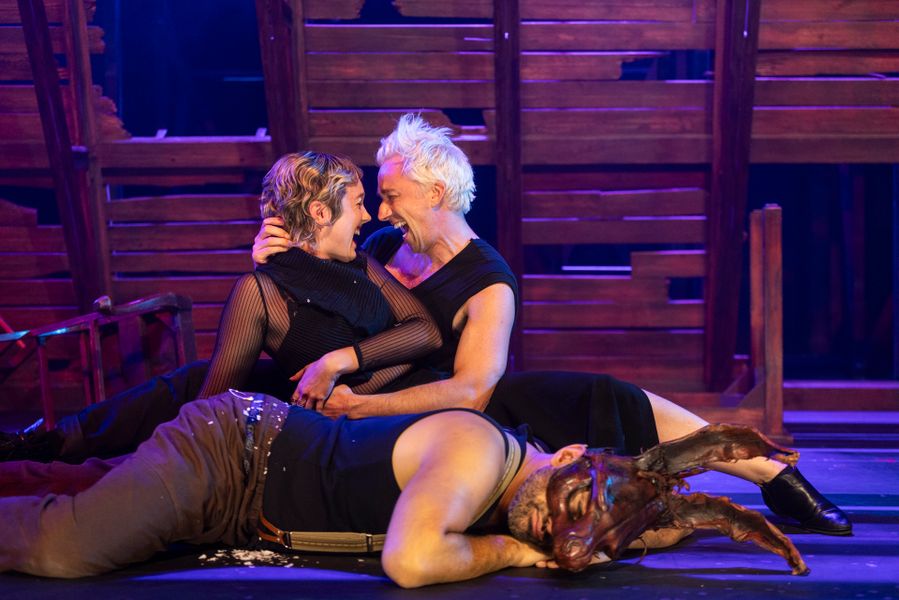
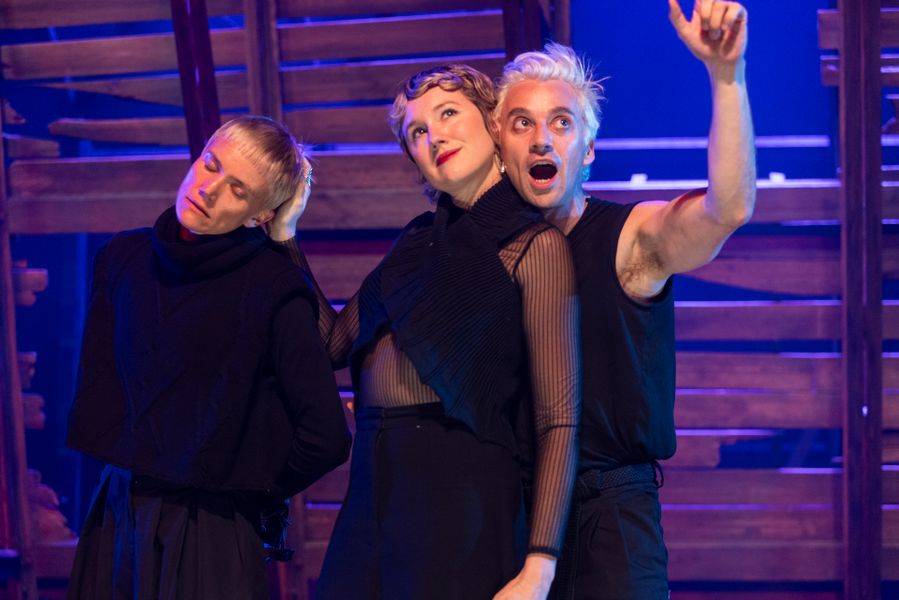

From the pages of our program, read Andy McLean's essay on A Midsummer Night's Dream as he experienced the production from the rehearsal room to stage.

Popular consensus has it that William Shakespeare lived in a golden age. A gilded epoch of enlightenment and discovery. The Renaissance was having a renaissance; Britannia ruled the waves; then James of Scotland became King of England and took it upon himself to promote the arts. Poets and writers across the British Isles could fleet the time carelessly as they did in the golden world.
Of course, popular consensus is a donkey’s bottom. (Or Bottom’s ass, if you will.)
Because Shakespeare’s era was one of plagues. It was a time of bad harvests, food riots, poverty and malnutrition. It was a time of religious persecution, war and of chronic unemployment. Successful playwrights were not necessarily wealthy (Ben Johnson died in squalor). Child mortality was perilously high (Shakespeare’s only son, Hamnet, perished at the age of 11) and the average life expectancy was only mid-forties. England was a paranoid police state where all sorts of imaginative forms of torture and execution were dished out. And thespians were most definitely exposed to violence (playwright Christopher Marlowe was both a perpetrator and a victim who wound up murdered at just 29 years old).
Shakespeare lived in one of the most precarious periods in English history and to think otherwise is madness. Midsummer madness.
Similarly, it is often assumed that A Midsummer Night’s Dream is a light and fluffy comedy, sprinkled liberally with gags and fairy dust. A whimsical romantic romp where lovers bicker, make up and then marry. (Or hate, expiate, and then fornicate.) It’s a world where:
Jack shall have Jill;
Nought shall go ill;
The man shall have his mare again, and all shall be well… if Puck is to be believed.
Which all appears pretty golden until you rub the love juice from your eyes and take a closer look. In fact, for two-thirds of A Midsummer Night’s Dream most of the lead characters are unhappy. There’s paternal wrath, bitter jealousy, unrequited love, and betrayal. (And that’s just in the first five minutes.)
True, there’s no shortage of laughs amid the sorrow, but these laughs are cleverly placed to heighten the dramatic impact. Shakespeare toys with the dichotomies of light and dark to allow the light to illuminate the dark, and the shadows to give depth to the light. And the overall effect gives a whole new meaning to the phrase “painfully funny”. Make no mistake, A Midsummer Night’s Dream is more a black comedy than a golden idyll.
Peter Evans’ 2024 production of A Midsummer Night’s Dream teases out this darkness in subtle ways. He’s kept the cast down to eight players and switched the opening scenes. To begin with, we are softened up with the hilarious capers of Bottom and the Mechanicals, then the actors switch personas before our very eyes and plunge us into the intense scene in Theseus’s court. The contrast could not be starker.
Suddenly we’re presented with Egeus, who wants his daughter Hermia to marry Demetrius against her wishes. So determined is he to impose his will that he’s prepared to have Hermia executed if she disobeys. We hear desperate pleas from a powerless Hermia (who is given a choice of submission, death or life in a convent) before hostilities escalate with Demetrius and Lysander at each other’s throats. Yet within the space of two lines, the tension is pierced by Lysander’s witty rejoinder:
You have her father’s love, Demetrius; Let me have Hermia’s – do you marry him.
In order to deliver up the laughs in A Midsummer Night’s Dream, Shakespeare’s characters endure a torrid time and poor Helena suffers more than most. She repeatedly describes her unrequited love for Demetrius as a kind of sickness. And it is. She’s afflicted with a love from which she can extract no joy, only pain. It’s adversely affecting her lifelong friendship with Hermia, who she envies:
Call you me fair? That fair again unsay.
Demetrius loves your fair: O happy fair!
O, teach me how you look, and with what art
You sway the motion of Demetrius’ heart.
By midway through the play, Helena’s self-esteem has sunk so low that she refuses to believe it when Demetrius and Lysander (thanks to fairy magic) declare their love for her. She’s livid with the boys (assuming it’s all a wind up) and lashes out at Hermia, accusing her of masterminding the ruse. It’s funny for us to watch, but it’s a brutal situation for poor, wretched Helena. Before we know it, and in a scene of pure slapstick, Helena is coming to blows with Hermia, then making a grovelling apology of sorts and regretting she ever came.
Mind you, she has plenty to be sorry for. Earlier in the play, Helena betrays Hermia’s trust and tells Demetrius of her friend’s plan to elope. That’s a pretty lousy thing to do, considering Hermia is under threat of death because of her love for Lysander. This begins the sequence of events that eventually leads to Hermia finding herself alone in the forest at night and rejected by a spellbound Lysander.








Here, it’s worth pausing to remember that Shakespeare’s audience would have experienced nighttime in a completely different way to me and you in 2024. Once the sun went down in Elizabethan England the outside world was very black indeed. Without electric street lamps, darkness was something that could truly cover a multitude of sins. So when the lovers decide to escape and cross 30 miles of forest at night, Puck is right to think: Lord, what fools these mortals be!
Simultaneously, Shakespeare uses the darkness as a device to exacerbate the suffering of the lovers; and to poke fun at them too. When Lysander admits to Hermia that they are lost in the forest, it’s a funny moment because she’s getting pretty fed up trudging about in the dark. Conversely, the more our characters express their discomfort, the funnier it becomes for us.
Nobody escapes this treatment. Even the heroic Lysander shows his dark side when fairy magic prompts him to fall for Helena, before deserting and rejecting Hermia in the cruelest fashion:
Why seek’st thou me? Could not this make thee know
The hate I bear thee made me leave thee so?
By now, the audience is in stitches at this turn of events. Unlike the lovers, and in a deft use of dramatic irony by the Bard, we’re in on the joke. The four-hander scene from which that quote comes is arguably one of the finest comic set-ups in theatrical history. And it succeeds precisely because of the dark depths to which Shakespeare allows his characters to sink.
Perhaps the darkest of all the lovers is Demetrius, who is prepared to coerce Hermia into marrying him. Such is his sense of entitlement, that he’s willing for her to be executed if she refuses. During the courtroom scene, we also learn that he previously seduced Helena, before casting her aside to set his sights on Hermia. Then he treats Helena in the most appalling manner (“I am sick when I do look on thee,” he says, before hinting that he may rape her or leave her “to the mercy of wild beasts” in the wood).
Yet even the cruelty of Demetrius provides comic moments. Infuriatingly for him, the more despicably he behaves, the more desperately Helena dotes on him.
Demetrius:
Do I entice you? Do I speak you fair?
Or rather do I not in plainest truth
Tell you I do not, nor I cannot love you?
Helena:
And even for that do I love you the more.
I am your spaniel; and, Demetrius,
The more you beat me I will fawn on you.
Use me but as your spaniel: spurn me, strike me,
Neglect me, lose me; only give me leave,
Unworthy as I am, to follow you.
In fact, the only redeeming behavior we ever really see from Demetrius is when the fairies intervene towards the end and he finally falls in love with Helena.
Speaking of the fairies, all is far from golden for the fairy folk, too. Titania and Oberon make their entrance bickering over the custody of a child (the latter appears to want the boy for no other reason than to score points against the fairy queen). Such is the scale and bitterness of their dispute that it’s affecting the weather around them.
Oberon’s solution to this dispute is to play a cruel prank on Titania, making her fall randomly in love (and lust) with whichever “vile thing” she next encounters in the forest. Enter the hapless Bottom, who Puck has transformed into half-man/half-donkey. The poor fellow is alone in the forest, having been deserted by his terrified friends, and now becomes a helpless pawn in the power play between the fairies.
It’s all hilarious of course. But there’s something about the games that the fairies play and the fun they have which points to the potential for danger. One suspects that Puck would do far worse (and certainly not bother to put things right) were he not bound by the will of Oberon. Yet it’s precisely because of this danger that we laugh so much.
And laugh we do. Because despite its dark depths – or more accurately, because of them – A Midsummer Night’s Dream will leave you LOL’ing in the aisles. In this, his most famous comedy, Shakespeare proves yet again that he is incapable of writing a play that doesn’t illuminate. And at the same time, his spot lit stage is nothing without a darkened audience to enjoy it. So sit back and enjoy. It’s black (it’s often blue), but it’s comedy gold.
This article was written by Andy McLean, a theatre nut who grew up in William Shakespeare's hometown of Stratford-upon-Avon. Now based in Sydney, Andy is a writer and podcaster for content agency Swash & Buckle.